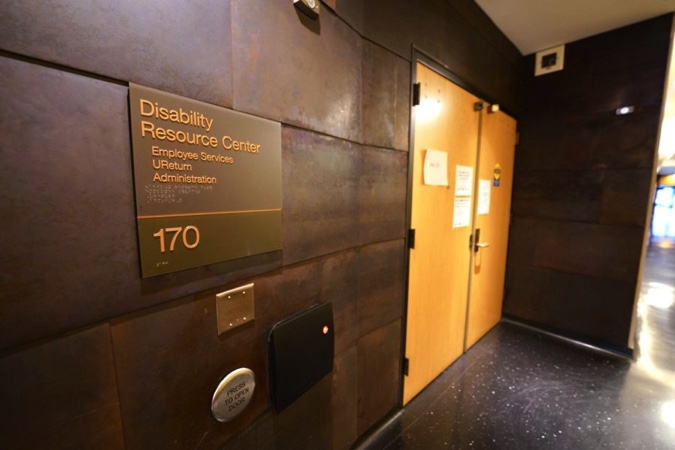Every afternoon last semester, Ren Marie sat in the same spot in their living room, studying for one class.
Even then, Marie — a University of Minnesota gender, women and sexuality studies first-year with a registered disability — barely passed.
After transferring from DePaul University in Chicago, Marie registered their post-traumatic stress disorder, borderline personality disorder, depression and anxiety with the University’s Disability Resource Center.
Marie thought a University letter stating they needed excused absences and more time on tests, among other accommodations, would help them navigate faculty interactions despite their mental health issues.
But sometimes, that wasn’t the case.
While the Americans with Disabilities Act of 1990 and section 504 of the Rehabilitation Act of 1973 bar discrimination against the disabled in higher education, Marie and other University students registered with the DRC say some professors dismissed repeated requests for alternate assignments — even as the number of students receiving accommodations through the DRC has increased in recent years.
As a result, the students’ mental health suffered. Marie’s GPA plummeted, for example, and they experienced heightened anxiety and panic attacks.
Professors want to help all their students succeed, disability experts say, but misconceptions about disabilities and mental illness can get in the way.
“The problem is not the students. The problem is the University doesn’t have the resources to give us the time that we need to accommodate the students,” said University disability studies instructor Angela Carter.
Throughout 2015, the University offered a 16-minute online faculty training, implemented after the passage of a 2012 University Senate Disability Issues Committee resolution, but the initiative wasn’t renewed after faculty complained the video was too long.
Some disability rights advocates say lack of training is a national issue. Along with politicians, they’re working to build momentum for a federal bill that would create a $10 million national center for college faculty disability accommodations training.
And with more funding toward the DRC and training for faculty, professor-student interactions could improve, Carter said.
“I want to put pressure on the University for more of an institutional shift,” she said.
Skeptical professors
Turquoya Rudnitski, a gender, women and sexuality studies student who was diagnosed with general anxiety disorder and major depressive disorder at 15, is in her third semester at the University and her sixth year taking college classes part-time.
She used to be a political activist and a track and rugby athlete, but with the onset of illness, had to give those up to spend most of her time studying and practicing coping mechanisms.
Still, because Rudnitski fears instructors will write her off as lazy or a liar, she doesn’t reach out when she needs help, causing her grades to suffer. She hasn’t registered with the DRC.
“In my experience with professors, the first time … something related to my illness comes up, they seem to be very understanding and accommodating,” she said. “After that, I feel judgment and doubt and I feel like that would be the same with or without a letter.”
For Rudnitski, the invisibility of her illness can make it harder to explain to professors, she said.
Mistrusting attitudes from instructors aren’t malicious but misunderstandings, said Mimi Corcoran, president and CEO of the National Center for Learning Disabilities.
Instructors often think if students with disabilities just work harder, they’ll succeed, she said. As a result, classes aren’t structured to fit all students’ needs.
Carter said she understands. After a near-death experience when a semi-truck T-boned the car she was driving 10 years ago, she now lives with cognitive impairments that necessitated accommodations in college through today.
Still, she said people doubt she’s disabled because her needs are mental, not physical.
Many of her students tell her they’re approached with the same skepticism. She estimated 70 percent of her conversations with students deal with how to explain their disability to a professor.
“That’s what I hear from a lot of my students: ‘My disability isn’t apparent, so teachers don’t think I need my accommodation,’” Carter said.
For some students, invalidation from professors has led to anxiety and worsened academic performance.
Marie, typically an ‘A’ student, is petitioning a grade after they said their professor failed to accommodate Marie’s heightened public speaking anxieties and other conditions.
And while Rudnitski isn’t sure a letter would help her succeed, Autumn Wetzel, a special education junior, said having an accommodations letter helped their grades and their mental health.
“I was constantly destroying my health to [meet] deadlines,” she said. “My health is so much better and my grades are higher, too, because even though I was getting work in before, it wasn’t always good work.”
‘Evening the playing field’
As stigma surrounding disabilities and mental illness falls, 20 percent more students registered with the DRC between fiscal year 2012 and fiscal year 2016.
University disability advocates say the center will need more funding and faculty members will require better preparation as the number of openly disabled students continues to rise.
“[Accommodations] can cause slightly more work for the professor … which is why I think there needs to be broader support campus-wide on getting more resources … and more information about disability,” Carter said.
Fixes could include helping professors understand the neurological causes for learning and mental health impairments and alerting staff to students’ legal rights to accommodations, Corcoran said.
Encouraging faculty to familiarize themselves with the available student resources can also alleviate misconceptions, she said.
Nationwide, faculty often lack proper education for assisting disabled students, Corcoran said. She backed the federal RISE Act of 2016, which, among other provisions, would’ve created a $10 million national center for college faculty disability accommodations training.
The bill didn’t pass through Congress but will be reintroduced this session, Corcoran said. The National Center for Learning Disabilities has been working with bipartisan legislators to gain traction for the proposed law, she said.
Some experts, like the University’s Institute on Community Integration Director David Johnson, say system-wide training isn’t feasible.
But as the University pushes for increased diversity on its campuses, it should consider disabilities a part of that, he said.
On a smaller scale, Carter tries to make her classes accessible for as many students as possible by providing class materials in multiple formats, encouraging students to share notes and basing participation grades on diverse criteria, among other strategies, she said.
Carter also implements accommodations on a case-by-case basis, regardless of whether students have a DRC letter.
“There is this idea that people that need accommodations for disability reasons are getting an advantage or are getting a leg up,” she said. “Access and accommodations [aren’t] an additional benefit. It’s evening the playing field.”
Her colleagues have wondered if students will take advantage of her teaching style, Carter said.
“I choose to believe and trust the students,” she said. “It hasn’t backfired for me yet.”









